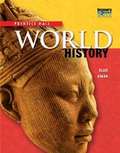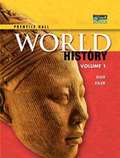- Table View
- List View
Prentice Hall World Geography: Building a Global Perspective
by Celeste Fraser Thomas J. BaerwaldThis program will help you learn content, develop skills, and apply what you know. Examine these pages to understand how this textbook and its online resources can guide you through the study of world geography.
Prentice Hall World History
by Elisabeth Gaynor Ellis Anthony EslerGrades 9-12. Textbook includes history from the beginning of civilization to the present.
Prentice Hall World History (Michigan Edition)
by Elisabeth Gaynor Ellis Anthony EslerLearning about the entire span of World History is no small task. This book has a number of important tools to make your study easier and more worthwhile.
Prentice Hall World History (New York)
by Elisabeth Gaynor Ellis Anthony EslerNIMAC-sourced textbook
Prentice Hall World History Florida Edition
by Esler EllisPrentice Hall World History, Student Text, Florida Edition
Prentice Hall World History Michigan
by Elisabeth Gaynor Ellis Anthony EslerWorld History-Michigan edition
Prentice Hall World History NY Edition
by Inc. Pearson Education Or Its AffiliatesPrentice Hall World History offers the exclusive Concept Connector Solution-an engaging personalized learning experience designed to make history stick and show students why history matters today. This highly acclaimed program enables students to go beyond the facts-by exploring enduring key concepts and essential questions that remain relevant today. Authors Ellis, Esler and Grant Wiggins, co-author of Understanding by Design, inspire students to apply their knowledge of history to current events. By learning about world history, your students will develop the knowledge needed to understand their world today and tomorrow. <p><p> Aligns instruction to the New York Core Curriculum for Global History & Geography <p> Provides Regents Examination practice within each chapter <p> Assessment resources provide ongoing preparation for the Regents Examination
Prentice Hall World History New Jersey
by Elisabeth Gaynor Ellis Anthony EslerNIMAC-sourced textbook
Prentice Hall World History Survey
by Elisabeth Gaynor Ellis Anthony EslerWith various techniques to make the learning interactive, this text covers world history from the beginnings of human civilization to the present.
Prentice Hall World History Tennessee
by Elisabeth Gaynor Ellis Anthony EslerNIMAC-sourced textbook
Prentice Hall World History The Modern Era
by Elisabeth Gaynor Ellis Anthony EslerNIMAC-sourced textbook
Prentice Hall World History, Michigan
by Elisabeth Gaynor Ellis Anthony EslerNIMAC-sourced textbook
Prentice Hall World History, New York
by Elisabeth Gaynor Ellis Anthony EslerNIMAC-sourced textbook
Prentice Hall World History, Pennsylvania
by Elisabeth Gaynor Ellis Anthony EslerNIMAC-sourced textbook
Prentice Hall World History, Tennessee
by Elisabeth Gaynor Ellis Anthony EslerNIMAC-sourced textbook
Prentice Hall World History, Virginia, Volume One
by Elisabeth Gaynor Ellis Anthony EslerNIMAC-sourced textbook
Prentice Hall World History, Volume 1
by Elisabeth Gaynor Ellis Anthony EslerNIMAC-sourced textbook
Prentice Hall World History, Volume 1
by Elisabeth Gaynor Ellis Anthony EslerWorld history textbook. From Early Civilizations (Prehistory to 1570 AD) to the Enlightenment and Revolution (1700-1850).
Prentice Hall World History: Connections to Today
by Elisabeth Gaynor Ellis Anthony EslerWorld history textbook.
Prentice Hall World History: Connections to Today
by Elisabeth Gaynor Ellis Anthony Esler Burton F. BeersWorld history textbook.
Prentice Hall World History: Connections to Today (Georgia Edition)
by Elisabeth Gaynor Ellis Anthony EslerWorld History: Connections to Today helps you learn what you need to know to master the Georgia Performance Standards for world history.


